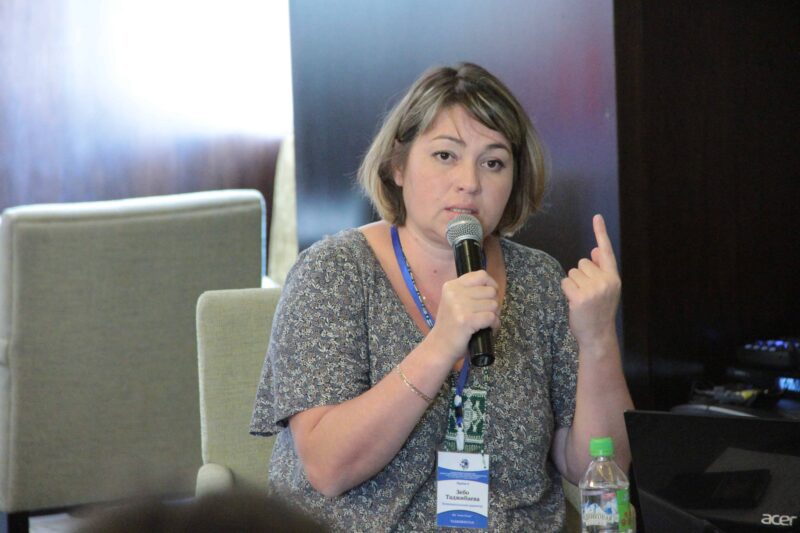Men’s treatment of women in public spaces has never received much public attention in Tajikistan. Even in Dushanbe, the country’s capital and home to nearly 1 million people, the subject has never broken into public discourse. And yet the city’s public spaces—open-air food markets, public transit, parks, bus stops—can hardly be called safe or comfortable for women. Stalking, rude gestures, unwanted physical contact, and verbal assaults against women have long been hidden from the public eye, behind social norms that preclude public discussion of the topic.
The country has no law on sexual harassment. However, this situation is starting to change, thanks in large part to an information campaign run by Internews partner Asia Plus, an independent news agency in Tajikistan which managed to spark a public conversation about the previously unmentionable.
Asia Plus launched a campaign to shed light on the challenges women face in Tajikistan, including discrimination and inequality in social, economic, and political life. The “I am a Woman and I am Capable” campaign, led by Asia Plus Director Zebo Tadjibaeva, also highlighted employment opportunities for women as well as stories of successful women. Over several months, Asia Plus published more than 40 stories on gender-related topics, such as women’s rights, entrepreneurship, leadership, and healthcare. The campaign is supported by Internews’ Access to Information program, A2i.
The first story in the media campaign focused on sexual harassment in public spaces and offices—a bold move which paid off in an engaged response from the public and eventually from law enforcement.
“Sexual harassment is a closed topic in Tajikistan. Women are afraid to talk publicly about harassment and speaking about it in the media is something unimaginable” said Tadjibaeva.
Another article about sexual harassment gained the most attention and steered much of the discourse, because it covered real-life stories of famous women in Tajikistan who had experienced abuse. These stories gave other women confidence to tell their own stories.
Subsequently, more articles featuring similar stories appeared in other media outlets and social media platforms, and the Ministry of Internal Affairs organized a roundtable on sexual harassment and its prevention.
“I came up with this idea [launching an information campaign in support of women] after attending several events conducted by Internews, where I met with many interesting people, who shared their knowledge and experiences on engaging audiences and building communities through media,” said Tadjibaeva. “Now, several people have already been punished for harassment of women on the streets of Dushanbe. I hope this positive tendency will bring more serious changes in our legislation.”
“When Asia Plus published an article about street harassment [with] resonance in society, we decided to develop a set of recommendations for women on how they can protect themselves and published it in Asia Plus to support the cause,” said Navruz Odinayev, member of the Public Council of the Ministry of Internal Affairs and Director of the Legal Firm Himoya (Protection).
According to Odinayev, representatives of law enforcement bodies approached him after the publication, confessing that they received many sexual harassment complaints but it was impossible to punish because of the absence of a specific law. At the roundtable, representatives of government institutions and civil society decided that street harassment against women should be punished as “malicious hooliganism” within the Code of Administrative Offenses of Tajikistan, and that these cases should be covered by the media.
The Ministry of Internal Affairs, with the support of civil society, media, and civic activists, launched a hotline in the beginning of 2019 which women can call to report sexual harassment cases or any other abuse against them. Law enforcement is already taking measures to improve the legal response to harassment: abusers convicted for “malicious hooliganism” are given a penalty in the amount of 350 somoni (about $35US), five days under arrest, or community service. Though these punishments are relatively minor, they are widely covered by local media outlets, realizing the attention needed to bring about change. Publicly acknowledging sexual harassment as an inappropriate and illegal act will serve to stigmatize such behavior and boost victims’ confidence to report abuse.
Internews’ work in Tajikistan is supported by USAID.
(Banner image: Zebo Tadjibaeva, Director of Information Agency Asia Plus at A2I’s Media and Social Innovation Lab, May 21-23, 2018, Dushanbe, Tajikistan, Photo © Internews)
